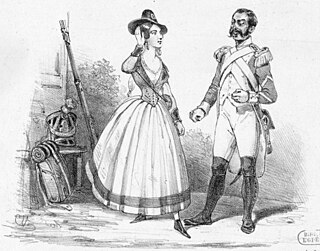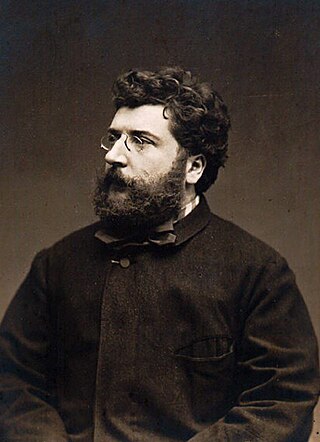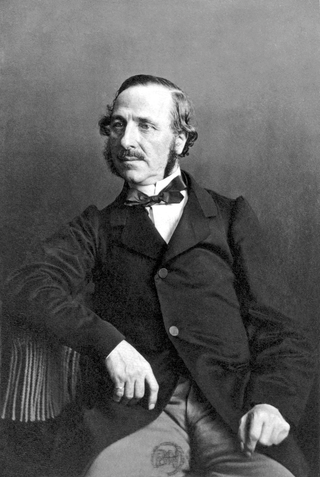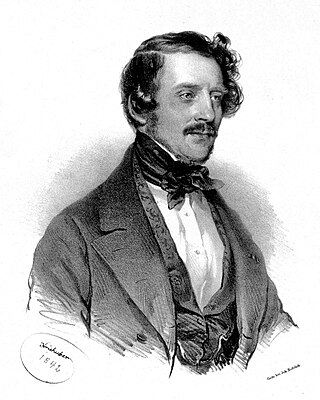| Ivan IV | |
|---|---|
| Opera by Georges Bizet | |
 Bizet in 1875 | |
| Librettist |
|
| Language | French |
| Based on | Life of Ivan the Terrible |
Ivan IV is an opera in five acts by Georges Bizet, with a libretto by Francois-Hippolyte Leroy and Henri Trianon. [1]
| Ivan IV | |
|---|---|
| Opera by Georges Bizet | |
 Bizet in 1875 | |
| Librettist |
|
| Language | French |
| Based on | Life of Ivan the Terrible |
Ivan IV is an opera in five acts by Georges Bizet, with a libretto by Francois-Hippolyte Leroy and Henri Trianon. [1]
A libretto on the subject of Tsar Ivan IV "The Terrible" of Russia was offered to Charles Gounod in January 1856 by the general administrator of the Paris Opera, François Louis Crosnier. Gounod worked with enthusiasm and press announcements anticipated that rehearsals would begin that November. Although Gounod completed the work in 1857 or 1858, failure to have it performed at the Paris Opera led Gounod to use parts of the score in later works; the Soldiers’ Chorus in Faust came from Ivan the Terrible. Gounod's score was auctioned in 1963 and destroyed shortly after. [2]
Around 1862, with Gounod's encouragement, Bizet began work on the same libretto. In June 1865 the journal La France Musicale announced that the piece would appear at the Théâtre Lyrique that winter. Delays in getting the piece accepted prompted Bizet to offer the score to the Paris Opera, but he had no reply. The following summer, at the bidding of Léon Carvalho, director of the Théâtre Lyrique, Bizet started work on La jolie fille de Perth , and Ivan IV was forgotten.
Winton Dean floated a possible alternative chronology by suggesting that the surviving manuscript is an earlier abandoned version of Ivan, forgotten by the composer, not that which was being copied for performance in the autumn of 1865. This theory would mean that Bizet composed Ivan the Terrible in late 1862 and early 1863 for performance in 1863 at the Baden festival (which he had visited with Hector Berlioz, Gounod and Ernest Reyer). Dean also argues for Ivan pre-dating Les pêcheurs de perles on the basis of the more conspicuous weak passages in the score bearing witness to a less experienced stage composer; also several passages in Ivan are developed further in the 1863 work. [3]
A manuscript score was found among the papers of Émile Straus (whom Bizet's widow had married) when he died in 1929, given to the Bibliothèque nationale, and put on public display at the Bizet Centennial Exhibition in 1938. A first concert performance with piano accompaniment may have taken place in 1940, and another in the winter of 1943 at the Théâtre des Capucins. [4] When Choudens asserted their right to publish the score in 1943, Henri Büsser took over its preparation and, instead of following the almost complete manuscript, concocted his own 'performing version'. [5]
The libretto is typical of the Eugène Scribe school, dealing with the manipulation of often improbable stock dramatic situations, rather than musical characterisation. [6] The strongest musical influences are Meyerbeer, Gounod, and Verdi.
Following a private performance of this revised score – in four acts instead of five and with many cuts – at Mühringen Castle near Tübingen, [7] it was performed at the Grand Théâtre de Bordeaux on 12 October 1951, the company giving two performances of their production at the Opéra-Comique in Paris that December. [8] The work then had performances in Cologne in April 1952, and Bern, Switzerland in December 1952. In the 1970s a more faithful edition was prepared for the BBC, with previously cut material restored; this version was broadcast by the BBC in October 1975, with Bryden Thomson conducting a mainly UK-based cast, with John Noble in the title role, and Jeanette Scovotti and John Brecknock as Marie and Igor; [9] this studio recording was issued on unofficial records. Subsequently, the conductor Howard Williams produced a complete performing edition, using his own version of the incomplete final scene (recycled from Bizet's material), which he performed at the Montpellier Festival – a performance broadcast by French Radio. A live recording of this version, now adopted by Choudens, was made in March 2002 conducted by Michael Schønwandt and issued by Naïve.
Following a premiere production of the full five-act version in St Petersburg in December 2022, the same version was produced at the Staatstheater in Meiningen in February 2023 conducted by Philippe Bach with Tomasz Wija in the title role and Alex Kim, Mercedes Arcuri and Paul Gay among the cast. [10]
| Role | Voice type | Cast, 12 October 1951 (Conductor: Adolphe Lebot) |
|---|---|---|
| Ivan IV, Tsar of Russia | bass | Pierre Nougaro |
| Marie, daughter of Temrouk | soprano | Georgette Camart |
| Igor, brother of Marie | tenor | Miro Skala |
| Temrouk, Prince of Circassia | bass | Michel Taverne |
| Yorloff, a boyar | bass-baritone | Charles Soix |
| A young Bulgarian | mezzo-soprano/tenor | René Coulon |
| Olga, sister of Ivan | mezzo-soprano | Marthe Couste |
| A Russian officer | tenor | Paul Grosjean |
| A Circassian | bass | Raymond Romanin |
| Chorus - Circassian women, Russian soldiers, Boyars, Courtiers | ||
In the Caucasus
Women are collecting water from a spring; a stranger who has lost his way asks for help. Marie, daughter of Temrouk offers to show him the path. A second stranger, Ivan in disguise, enters and leaves with the young stranger. Russian soldiers burst in and order Temrouk to surrender his daughter to them. The king refuses, but when an officer threatens to murder the children, Marie goes with them. Igor arrives as the Circassians lament their fate, and he vows to kill the enemy. Temrouk orders that the avenger must be chosen by lot; it is Igor.
A banquet in the Kremlin
Boyars celebrating the victory of Ivan over the Tartars. Condemned criminals pass by begging for mercy but in vain. Ivan congratulates Yorloff, who had uncovered the conspiracy, and commands the young Bulgarian to sing of his homeland. The tsar responds with a battle song. Ivan had sought the most beautiful girl in the land to be his wife. Yorloff is confident that his own daughter will be chosen, and a group of maidens enter the hall. Ivan commands them to remove their veils, but Marie refuses. Although she is forced to do this, she refuses to become his wife. Ivan’s sister Olga passes through in a religious procession and Marie puts herself under her protection.
Kremlin courtyard
People sing praises on the marriage of Ivan and Marie. The cortege approaches and Igor steals on. Temrouk also enters at this moment. Yorloff reveals to Igor that he too has a grievance against Ivan and the three of them prepare to assassinate Ivan that night.
A room outside the nuptial chamber
Marie muses on her fate – she has fallen in love with Ivan. Ivan enters to lead her to the nuptial boat on the Volga. Yorloff tells the tsar that he will watch out for assassins, and when Ivan has left admits Igor. When Marie enters, brother and sister embrace and she is horrified when Igor tells her he has come to kill the tsar. Igor is about to stab her when Marie reminds him that their mother had placed her under the protection of her brother. He forgives his sister and embraces her. Ivan and Yorloff enter and the latter denounces Igor. Ivan, heartbroken by Marie’s supposed treachery hesitates to condemn her. An officer enters to announce that the Kremlin is on fire and enemies are attacking the gates. Ivan condemns Igor and Marie then collapses.
Scene 1 – the walls of the Kremlin
Temrouk is agonised by events: his children have been condemned to death. Ivan has regained his senses and enters, and when the bell announcing death of a tsar tolls, they both rush off to the palace.
Scene 2 – a hall in the Kremlin
Yorloff proclaims himself regent, as the tsar had lost his reason. The courtiers call for the death of Igor and Marie. Ivan bursts in and reveals Yorloff’s plots and condemns him to die. Courtiers sing praises to Ivan and Marie.
Bizet re-used some music from earlier pieces and also recycled other sections in later works:
A complete BBC broadcast in the Bizet centenary year featured John Noble in the title role, Jeanette Scovotti, John Brecknock, Patricia Kern, with orchestra and chorus conducted by Bryden Thomson and included commentary by Winton Dean and all the versions of the war song; [11] it was later made available by the Oriel Music Trust.

Carmen is an opera in four acts by the French composer Georges Bizet. The libretto was written by Henri Meilhac and Ludovic Halévy, based on the novella of the same title by Prosper Mérimée. The opera was first performed by the Opéra-Comique in Paris on 3 March 1875, where its breaking of conventions shocked and scandalised its first audiences. Bizet died suddenly after the 33rd performance, unaware that the work would achieve international acclaim within the following ten years. Carmen has since become one of the most popular and frequently performed operas in the classical canon; the "Habanera" from act 1 and the "Toreador Song" from act 2 are among the best known of all operatic arias.

La fille du régiment is an opéra comique in two acts by Gaetano Donizetti, set to a French libretto by Jules-Henri Vernoy de Saint-Georges and Jean-François Bayard. It was first performed on 11 February 1840 by the Paris Opéra-Comique at the Salle de la Bourse.

Georges Bizet was a French composer of the Romantic era. Best known for his operas in a career cut short by his early death, Bizet achieved few successes before his final work, Carmen, which has become one of the most popular and frequently performed works in the entire opera repertoire.

Faust is an opera in five acts by Charles Gounod to a French libretto by Jules Barbier and Michel Carré from Carré's play Faust et Marguerite, in turn loosely based on Johann Wolfgang von Goethe's Faust, Part One. It debuted at the Théâtre Lyrique on the Boulevard du Temple in Paris on 19 March 1859, with influential sets designed by Charles-Antoine Cambon and Joseph Thierry, Jean Émile Daran, Édouard Desplechin, and Philippe Chaperon.

Khovanshchina is an opera in five acts by Modest Mussorgsky. The work was written between 1872 and 1880 in St. Petersburg, Russia. The composer wrote the libretto based on historical sources. The opera was almost finished in piano score when the composer died in 1881, but the orchestration was almost entirely lacking.

A Life for the Tsar is a "patriotic-heroic tragic opera" in four acts with an epilogue by Mikhail Glinka. During the Soviet era the opera was known under the name Ivan Susanin.

Mireille is an 1864 opera in five acts by Charles Gounod to a French libretto by Michel Carré after Frédéric Mistral's poem Mirèio. The vocal score is dedicated to George V of Hanover.

La jolie fille de Perth is an opera in four acts by Georges Bizet (1838–1875), from a libretto by Jules-Henri Vernoy de Saint-Georges and Jules Adenis, after the 1828 novel The Fair Maid of Perth by Sir Walter Scott. Many writers have reserved severe criticism for the librettists for their stock devices and improbable events, while praising Bizet's advance on his earlier operas in construction of set pieces and his striking melodic and instrumental ideas.

Djamileh is an opéra comique in one act by Georges Bizet to a libretto by Louis Gallet, based on an oriental tale, Namouna, by Alfred de Musset.

The Maid of Pskov, also known as Ivan the Terrible, is an 1872 opera originally in three acts by Nikolai Rimsky-Korsakov. The libretto is by the composer, after the play by Lev Mei.

Otto mesi in due ore ossia Gli esiliati in Siberia is an opera in three acts by Gaetano Donizetti to a libretto by Domenico Gilardoni.

La reine de Saba is a grand opera in four or five acts by Charles Gounod to a libretto by Jules Barbier and Michel Carré inspired by Gérard de Nerval's La Reine de Saba, in Le voyage en Orient. It was premiered at the Salle Le Peletier by the Paris Opera on February 28, 1862. The magnificent first production was directed by Eugène Cormon, with costumes designed by Alfred Albert and Paul Lormier, and scenery by Édouard Desplechin, Charles-Antoine Cambon and Joseph Thierry, Hugues Martin, and Joseph Nolau and Auguste Alfred Rubé.
Jeux d'enfants Op. 22, is a suite of twelve miniatures composed by Georges Bizet for piano four hands in 1871. The entire piece has a duration of about 20 to 23 minutes.

The Théâtre Lyrique was one of four opera companies performing in Paris during the middle of the 19th century. The company was founded in 1847 as the Opéra-National by the French composer Adolphe Adam and renamed Théâtre Lyrique in 1852. It used four different theatres in succession, the Cirque Olympique, the Théâtre Historique, the Salle du Théâtre-Lyrique, and the Salle de l'Athénée, until it ceased operations in 1872.

The Symphony in C is an early work by the French composer Georges Bizet. According to Grove's Dictionary, the symphony "reveals an extraordinarily accomplished talent for a 17-year-old student, in melodic invention, thematic handling and orchestration." Bizet started work on the symphony on 29 October 1855, four days after turning 17, and finished it roughly a month later. It was written while he was studying at the Paris Conservatoire under the composer Charles Gounod, and was evidently a student assignment. Bizet showed no apparent interest in having it performed or published, and the piece was never played in his lifetime. He used certain material from the symphony in later works, however. There is no mention of the work in Bizet's letters, and it was unknown to his earlier biographers. His widow, Geneviève Halévy (1849–1926), gave the manuscript to Reynaldo Hahn, who passed it along with other papers to the archives of the conservatory library, where it was found in 1933 by Jean Chantavoine. Soon thereafter, Bizet's first British biographer Douglas Charles Parker (1885–1970) showed the manuscript to the conductor Felix Weingartner, who led the first performance in Basel, Switzerland, on 26 February 1935.

Don Procopio is a two-act opera buffa by Georges Bizet with an Italian libretto completed in 1859, and first performed in 1906.

Henri Trianon was a French critic, librettist and translator of works by Homer and Plato, and operas by Weber and Mozart into French. He was an artistic and literary critic in Paris who eventually became teacher. In 1842 he became under-librarian and then librarian at Sainte Geneviève in 1849. From 1857-59 Trianon was associated with Nestor Roqueplan in the administration of the Opéra-Comique.

L'Ange de Nisida is an opera semiseria in four acts by Italian composer Gaetano Donizetti, from a French-language libretto by Alphonse Royer and Gustave Vaëz.

Les pêcheurs de perles is an opera in three acts by the French composer Georges Bizet, to a libretto by Eugène Cormon and Michel Carré. It was premiered on 30 September 1863 at the Théâtre Lyrique in Paris, and was given 18 performances in its initial run. Set in ancient times on the island of Ceylon, the opera tells the story of how two men's vow of eternal friendship is threatened by their love for the same woman, whose own dilemma is the conflict between secular love and her sacred oath as a priestess. The friendship duet "Au fond du temple saint", generally known as "The Pearl Fishers Duet", is one of the best-known in Western opera.